
BLUES JUNCTION Productions
7343 El Camino Real
Suite 327
Atascadero, CA 93422-4697
info
- Home
- Letter From the Editor
- Tom Hyslop: A Personal Appreciation
- Top Ten Albums of 2022
- Dave's Top Ten List of Top Ten Lists
- An Appreciation of James Harman
- Album of the Year: The Duke Robillard Band They Called It Rhythm & Blues
- Album Review: Rick Holmstrom Get It!
- Album Review: The Phantom Blues Band - Blues for Breakfast
- Album Review: Bob Stroger & the Headcutters That’s My Name
- Album Review: Hash Brown - Stop! Your Evil Ways
- Archives
- Contact Us
- Links
Dennis Gruenling
 It has become a Thursday morning (10:00am PST) tradition here in the offices of BLUES JUNCTION to listen to the Blues and the Beat program on WFDU FM out of New Jersey. The show’s long time host is Dennis Gruenling. Dennis is a blues musical historian and avid record collector. Each Thursday he “spins” from his personal collection. It is great fun to hear a guy on the air who is so intimately familiar with so many terrific recordings.
It has become a Thursday morning (10:00am PST) tradition here in the offices of BLUES JUNCTION to listen to the Blues and the Beat program on WFDU FM out of New Jersey. The show’s long time host is Dennis Gruenling. Dennis is a blues musical historian and avid record collector. Each Thursday he “spins” from his personal collection. It is great fun to hear a guy on the air who is so intimately familiar with so many terrific recordings.
It is this sense of musical history that he brings to his dynamic harmonica playing. He is also aware that he is adding to this rich history by his own terrific recorded contributions. In fact, Dennis has a new album out that was released back in October entitled, Rockin’ All Day. He is backed by Doug Deming and the Jewel Tones. Doug also has a new album out that was released the same month with his band the Jewel Tones, entitled, What’s It Gonna Take, where he is backed by Dennis. Both these titles are available through the Vizztone Music Group.
A few months back Dennis contributed an essay to BLUES JUNCTION on one of his musical heroes, George “Harmonica” Smith. Last month I interviewed one of mine, Dennis Gruenling.
David Mac (DM): As you know I am a regular listener to your radio show Blues and the Beat out of New Jersey. You keep the focus squarely on the music but I have to ask you, do you have a background in radio or any formal training because you are seamless behind the mic?
Dennis Gruenling (DG): No formal training, in fact I dread public speaking, but I love this music. The first year I listened to myself and was like “Oh boy, I’ve got to change some stuff.” I’ve always been into music, so I used to listen to a lot of radio when I was younger.
DM: I enjoy the thematic segments that you insert into the program.
DG: I started doing the themes about a year into the show, because if I just did a free for all, I had so many songs to choose from I couldn’t possibly know what to play. It’s too much for me to figure out, so I started doing themes. I try to keep it changing. Sometimes I do recordings from a particular year. For me that’s interesting. Sometimes I just pick a sub genre of blues and pick from my play list at home from my master music library on my iTunes.
DM: It does make it interesting and fun.
DG: You just don’t hear this kind of thing anymore. I miss that. I know talking about this kind of thing makes me sound like an old man, but I know there’s less of an appreciation, less of an understanding of the history of the music. I mean if you download something you don’t get liner notes. That’s where I learned a lot of stuff.
There’s a local DJ here Bob Porter. He was one of the guys I listened to when I first got into this music. I learned a lot of stuff from him and from reading liner notes. Sure you can go on YouTube and listen to a song but you don’t get any information.
DM: I am fairly certain you have amassed a pretty impressive music library through the years.
DG: I’ve got a couple thousand LPs. In the past couple years, I may have surpassed that in CDs. I mainly started in LPs and I still prefer to listen to and build my library up from vinyl. Vinyl just sounds better.
DM: Do you have any 78s or 45s?
DG: I have a couple hundred 78s and somewhere in the neighborhood of fifty to a hundred 45s.
DM: Do you play vinyl on your show?
DG: I do sometimes. It is kind of a hassle carrying around that much vinyl, so I don’t do it all the time.
DM: Do you remember a particular recording that made you say, “I want to hear more of this and I want to make this kind of music.”
DG: Ironically, the first time that I really sat and listened to blues was the moment I got my first harmonica. A good friend of the family plays banjo, guitar and harmonica. One year for Christmas he said “Hey, you want a harmonica?”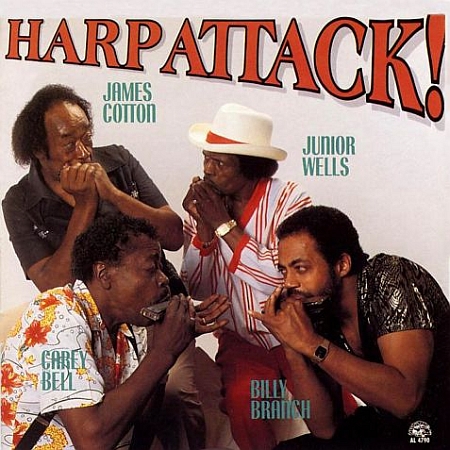
He wanted to give me the harmonica in exchange for the album, Harp Attack.
DM: That’s the one with James Cotton, Junior Wells, Carey Bell and...
DG: ... Billy Branch, right. So I’m opening this package which had the harmonica in it on Christmas and I am handing him this album.
DM: Let me jump in here and ask why did he have you get him that record?
DG: I was a record collector back then and he knew I knew where to find it. I had to special order this album. I didn’t know anything about blues. I’m looking at him like “Well you just gave me a harmonica, let me hear the record.” From that moment on, that was it. It was really what I was looking for and what I really love, but I just didn’t know it until that moment.
DM: I hear a lot of jazz influences in your playing. Is that an accurate assessment?
DG: Yes it is. I’m a big traditional jazz and swing fan. I love that stuff. It resonates with me the same way the blues does.
DM: I am always amazed at folks who identify themselves as hardcore blues fans but do not care for and, therefore, don’t listen to jazz. To me both forms are so complementary to one another. Musically, ideas come from both places and when those ideas cross paths you have some really great music.
DG: Absolutely! I think it is kind of sad these days that blues seems to be absorbing all kinds of influences except jazz. Jazz also seems to have gotten away from the bluesy aspects, the feeling aspect of it, the danceable aspect of it and gotten more based on theory and concept. As you know Dave, in the 1940's all of the blues and jazz guys would record together, and they’d go from band to band. I love that era. I like 20's stuff. I love delta blues which is far from the jazz stuff, but in a way it’s similar, the harmonic structure of some of those things are kind of jazzy. You hear a lot of the r&b and jump and swing influence in John Lee Williamson (Sonny Boy One) for instance.
DM: It is important to remember jazz and swing were the popular music of the day. It was on the radio. It would be hard for young bluesmen not to be influenced by this sound.
DG: I think about that as I develop my sound. Listen, my favorite musician of all time is not a 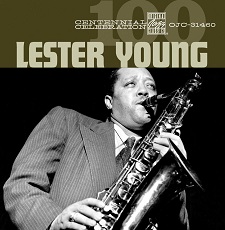 harmonica player but a sax player, Lester Young. I love the great tenor players, I love baritone as well, but tenor sax is probably, from a jazz and swing standpoint, the most influential instrument for me.
harmonica player but a sax player, Lester Young. I love the great tenor players, I love baritone as well, but tenor sax is probably, from a jazz and swing standpoint, the most influential instrument for me.
DM: Besides Lester Young, who are some of the other players that have had an impact on you?
DG: Illinois Jacquet, Gene Ammons, Wardell Gray, Louis Jackson, Red Prysock, there’s just so many.
DM: This past October, Vizztone Records released your 5th album, and they released another where your name appears on the cover under the banner “Featuring Dennis Gruenling.” I want to talk about these recordings of course, but let’s back up and talk about your development as a musician which led to your first record.
DG: I started playing in some local bands here in New Jersey. I was playing for less than two years when I had my first regular gig. I wasn’t great but I wasn’t terrible. I was clearly not an accomplished player but I had a musical sense of what I was doing, even though I wasn’t that great at the time. I’ve always had luck musically. It came pretty natural to me. As a kid I thought everybody made up songs. I eventually realized everybody doesn’t make up songs. Other kids would say, “You do WHAT?” (laughs) Turning it actually into music is a different story. I didn’t sound good when I first started playing you know, no one really does.
DM: Let’s talk about your first album.
DG: The first one I had was, Dennis Gruenling and Jump Time which came out in 1999.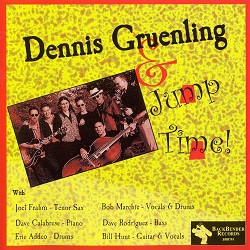 That band was basically a little “all star” band I put together from a couple of bands I played with at the time. I had a vision of doing a swing influenced, jump blues kind of thing.
That band was basically a little “all star” band I put together from a couple of bands I played with at the time. I had a vision of doing a swing influenced, jump blues kind of thing.
DM: What memories stand out about making that record and are there things that, as you look back on it, you would do differently?
DG: I think you look back on any record and there are things you would have done differently. It was one recording session and it was a long day. We recorded all the tracks in one day except for one song. So we did one song the second day and basically mixed it and that was the record. Of course I wouldn’t do that now because it’s too much of a pain in the ass. I had even more of a limited budget than I do now. I just got everybody for one long day and made it happen. It was kind of crazy.
DM: Somehow you made it work because they let you keep making music.
DG: I tried to vary my records from one to the next so I started with a jump record as I said. Then the second record I did, Up all Night, I wanted to have more of a Chicago feel so I did that. I came out with another jump record and there was a hiatus there because I was playing with other bands. When it came time to do another record, I wanted to do something different.
DM: Let’s talk about the Little Walter tribute album, I Just Keep Lovin' Him.
DG: It was kind of like a dream project of mine.
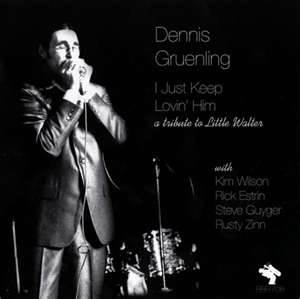 DM: I would think that a record of this nature would be kind of intimidating for a harmonica player.
DM: I would think that a record of this nature would be kind of intimidating for a harmonica player.
DG: Sure, and rightfully so. I mean think about it, not only is he obviously one of the best blues harmonica players ever, if not the best, he’s also an innovator and very influential blues musician. I realized nobody had done a Little Walter tribute since the year he died. No one from 1968 until 2008 when I released, I Just Keep Lovin' Him had done a Little Walter tribute. Forty years, think about that. I researched it, I couldn’t find any tribute.
DM: Didn’t George “Harmonica” Smith do a Little Walter tribute album?
DG: George Smith is, as you know Dave, one of my favorites. He recorded his tribute album to Walter the year Walter died.
DM: What is it about Walter’s playing that moves you?
DG: Aside from having great execution, he was just very musically creative. He always had a great stream of ideas. He never seemed limited in what he wanted to do. Like any great musician, when you look at the span of their career, you can hear their sound change over the years. Like any great jazz musician, over time you hear the different phases of their styles and the changes. Walter was always very creative.
DM: You were joined on that project by some great players.
DG: Oh yeah. I bought in Kim Wilson, Rick Estrin and Steve Guyger. I wanted to choose, not only from my favorite players, but also some of my favorite players who could do this style, who could play in a Little Walter vein. There are a few others out there who I could have included but I didn’t want to have like ten players on the record. I’ve known these guys for years and I just thought you couldn’t get any better. Like I said there are other guys I could have gotten as well, but it’s tough to top the guys that I invited on the record. I’m glad they decided to do it.
DM: How did you meet Doug Deming?
DG: We met each other through mutual musical friends, one of them being Kim Wilson. He’s played, toured with Kim here and there over the years. Doug is also another microphone freak. He was looking for a harmonica player to take out on the road. He called me and it was like, “Oh yeah, I’ve known about you.” and he said “Well, I’ve known about you.” Before you know it I drive overnight in my van to Detroit, stopped to have a yogurt and change and got right back in the van and went on to work. And that was that.
DM: Last October, Vizztone Records released two CDs two weeks apart that I want to talk about.
DG: My record is entitled, Rockin’ All Day by Dennis Gruenling featuring Doug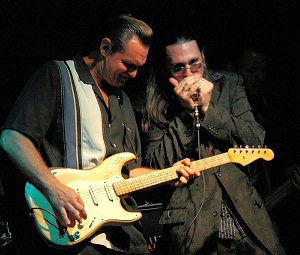 Deming and the Jewel Tones. The other CD, is What’s it Gonna Take by Doug Deming and the Jewel Tones featuring Dennis Gruenling. I wanted my record to have more of a jump blues vibe, maybe even a little rock and roll feel, 60s kind of vibe to it. I was just trying to change up my record concepts. The last thing was sort of a Chicago concept so I wanted to go in a little different direction this time.
Deming and the Jewel Tones. The other CD, is What’s it Gonna Take by Doug Deming and the Jewel Tones featuring Dennis Gruenling. I wanted my record to have more of a jump blues vibe, maybe even a little rock and roll feel, 60s kind of vibe to it. I was just trying to change up my record concepts. The last thing was sort of a Chicago concept so I wanted to go in a little different direction this time.
I had an excuse to record with Doug as he was up here in New Jersey from Florida where he lives now. We finished my record down in Florida and then I started working on Doug’s CD. We recruited the band we have been on the road with together. So when we did those sessions, they were already kind of pieced together, so we finalized the song choices and made it seem like it was a “whole”.
DM: There is some great original material on both CDs and some very cool covers. How did you go about selecting that material for your album.
DG: Well, it’s got to have a combination of things. I try to choose stuff that’s obscure. There are a lot of great songs that have been redone over and over again because  they’re great songs but there’s so many thousands of other tunes out there. So it’s got to be something that’s obscure. This kind of material is obscure sometimes because it was just released by a small label and never went anywhere. I will pick a tune maybe because of a particular groove or arrangement. You know the Jimmy McCracklin tune, I love his early stuff, he did some great jump stuff and I love the sound of his band. Obviously there was no harp on that original recording but he played harp on some of his early records. Just that particular song I loved the groove, thought it was a pretty cool lyric and I felt like it fit a harp band and our style and what we do musically. When it comes to anything else like, It Went Down Easy, I just started with a killer song from Melvin Flint, but he’s an obscure artist. It wasn’t like a big record or anything but you know it’s different enough to break away from the regular twelve bar blues cover with a cool lyric, a cool tune, a cool idea.
they’re great songs but there’s so many thousands of other tunes out there. So it’s got to be something that’s obscure. This kind of material is obscure sometimes because it was just released by a small label and never went anywhere. I will pick a tune maybe because of a particular groove or arrangement. You know the Jimmy McCracklin tune, I love his early stuff, he did some great jump stuff and I love the sound of his band. Obviously there was no harp on that original recording but he played harp on some of his early records. Just that particular song I loved the groove, thought it was a pretty cool lyric and I felt like it fit a harp band and our style and what we do musically. When it comes to anything else like, It Went Down Easy, I just started with a killer song from Melvin Flint, but he’s an obscure artist. It wasn’t like a big record or anything but you know it’s different enough to break away from the regular twelve bar blues cover with a cool lyric, a cool tune, a cool idea.
DM: It has been my observation that every good player is a good listener. It has to be through recordings since, at least for me growing up in suburban Los Angeles in the 60's and 70's, this music is not part of my surroundings.
DG: Amen to that! Those were the exact thoughts I had when I first got into this music. If I’m going to try to be good at this and I want to try to get maybe as close to as good as some of these great players were, then listening to the recordings is the only way that I have a chance to have that happen. The people who made this music in the old days were around this music 24/7. Maybe their parents played musical instruments. There were fish fries. There were house parties. There was music on the streets. There was this music in clubs and on the jukeboxes. I mean it was around them all the time. I couldn’t do that growing up in central Jersey in the 80's. 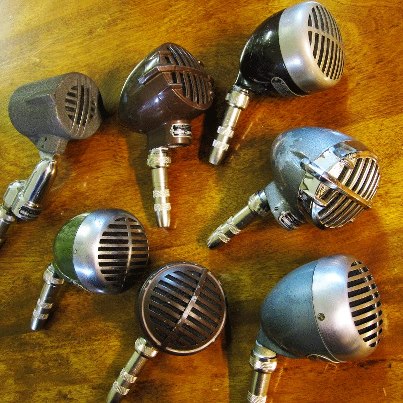 I had to get my hands on the records and LISTEN.
I had to get my hands on the records and LISTEN.
DM: What’s next for you Dennis?
DG: Since Doug and I both got signed with Vizztone and we have two new records out there we would like to hit the road more. We’re booking stuff for next year already. We want people hear us and see what happens. Hopefully, they like us.
DM: If they like great blues music, that shouldn’t be a problem. I have listened to both albums and you should be very proud. There is some swinging stuff on there. I hope that road can take you and Doug all the way out to the west coast.
DG: Thanks Dave. I hope so too.
Copyright 2022 BLUES JUNCTION Productions. All rights reserved.
BLUES JUNCTION Productions
7343 El Camino Real
Suite 327
Atascadero, CA 93422-4697
info